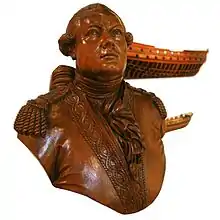Antoine Groignard
Antoine Groignard (born 4 February 1727, died 26 July 1799), was a French naval constructor who developed standard designs for French war ships, and built and improved the dry docks at the French naval bases in Toulon and Brest.
Antoine Groignard du Justin | |
|---|---|
 Bust of Antoine Groignard at Toulon naval museum. | |
| Birth name | Antoine Groignard |
| Born | February 4, 1727 Solliès-Pont, France |
| Died | July 26, 1799 (aged 72) Paris, French Republic |
| Allegiance | |
| Service/ | |
| Years of service | 1747–1790 1792–1798 |
| Rank | Ingénieur général de la marine |
| Unit | Corps of Naval Constructors |
| Battles/wars | Seven Years' War * Defense of Le Havre 1759 |
| Awards | Prize of the French Academy of Sciences 1759 Prize of the Académie de Marine 1765 Member of the Académie de Marine 1769 Knight of the Order of Saint Louis 1775 Ennobled 1780 |
| Spouse(s) | Marie Élisabeth Catherine Boucher de la Boucherie (1767) [1] |
Family
Groignard was son of a master mariner, admiralty pilot, hydrographer and shipowner. In 1767 he married Marie Élisabeth Catherine Boucher de la Boucherie, a daughter of a captain of troops in the service of the French East India Company. The couple had a son and a daughter; the son becoming a frigate captain in the French navy.[1]
Career

Groignard became a student at the shipbuilding school in Paris (one of the predecessors of today's ENSTA ParisTech). Appointed assistant naval constructor at Brest in 1747 and at Rochefort 1749, he was promoted to naval constructor in 1754. Attached to the French East India Company at Lorient, he designed ships suitable for combat and commerce; among them the Duc de Duras that later became the famous American frigate Bon Homme Richard.
During the Seven Years' War, he distinguished himself in defending Le Havre against the British floating batteries. As an adviser to the minister of marine, he standardized the design of ships at the several naval dockyards of France. Promoted to chief constructor in 1769, he was put in charge of building the docks of Toulon, solving the difficult technical problems involved. In 1782 Groignard was promoted to constructor general with the rank of post-captain, working on the docks at Brest putting them in condition to receive the largest ships of the Navy. He notably directed the construction of Bretagne.[2]
Due to sickness he retired in 1790. Recalled to duty Groignard was in charge of the construction of Port-de-Bouc 1792-1795, and a project for draining the salt marshes of the Marignane in Saint-Miter 1793-94. Groignard was in charge of the naval administration of Toulon in preparation for the French campaign in Egypt and Syria.[3][4][5][6][7]
Awards
Groignard studied the stowage of ships and modified the positioning of the frames to increase its strength. In 1759 he was awarded the prize of the Academy of Sciences for a memoir on the solidity of vessels. In 1765, he won a prize from the Marine Academy with a memoir on the stowage of ships: "Mémoire sur l'arrimage des vaisseaux". Deputy member of this academy in 1752; full member 1769. Knight of the Order of Saint Louis 1775. Raised to nobility in 1780.[1][3][6][8]
References
- Notes
- "Antoine GROIGNARD." Geneanet. Retrieved 2017-03-26.
- Demerliac, 1774—1792, n°1, p. 15
- "Antoine Groignard." Site officiel de la mairie de Solliès-Pont. Retrieved 2017-03-26.
- "Le Duc de Duras." Archeologie & Modelisme d'Arsenal. Retrieved 2017-03-26.
- "Antoine Groignard." Écomusée Vallée de Gapeau. Retrieved 2017-03-26.
- "Antoine Groignard." L'Académie de marine. Retrieved 2017-03-26.
- "41AP. GROIGNARD (Antoine)." Archives nationale. Retrieved 2017-03-27.
- "Antoine Groignard (1727-1799)." Biblioteque nationale de France. Retrieved 2017-03-27.
- "Rue Antoine Groignard, Toulon, France." Actualité des feuilles de route des villes de France. Retrieved 2017-03-27.
- Bibliography
- Demerliac, Alain (2004). La Marine de Louis XVI: Nomenclature des Navires Français de 1774 à 1792 (in French). Éditions Ancre. ISBN 2-906381-23-3.